Naija News
Labour Party Chairman Faces Opposition: NLC Protests Planned Convention
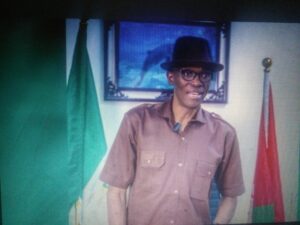
Tensions flared in Abuja as protesters from the Nigeria Labour Congress (NLC) descended upon the Labour Party (LP) secretariat, demanding the removal of the party’s National Chairman, Julius Abure. The NLC alleges that Abure is orchestrating a national convention without proper consultation with relevant stakeholders, a move they perceive as detrimental to the integrity of the Labour Party.
The core of the NLC’s grievances lies in their assertion that Abure is planning a clandestine convention, effectively sidelining key stakeholders within the party. Such actions, they argue, could potentially undermine the democratic principles upon which the Labour Party is founded. By excluding voices from the decision-making process, Abure risks alienating party members and eroding trust in the party’s leadership.
This confrontation has not only pitted Abure against the NLC but has also drawn the attention of the House of Representatives caucus. The discord within the party threatens to disrupt the internal cohesion necessary for effective governance and political representation.
Despite their determination to voice their concerns, the protesting workers faced resistance from the Nigeria Police Force, who barred their entry into the party secretariat. The denial of access underscores the heightened tensions surrounding the issue and reflects the complexities of navigating political dissent within Nigeria’s democratic landscape.
At the heart of this controversy lies the fundamental question of inclusivity and transparency within political party structures. For democracy to thrive, it is imperative that party leaders engage in open dialogue with their constituents and heed their concerns. Disregarding the voices of stakeholders, as alleged in this case, risks breeding resentment and further exacerbating existing divisions.
As the standoff between the NLC and the Labour Party leadership continues, it underscores the importance of fostering a culture of accountability and participatory governance within Nigeria’s political institutions. Only through genuine dialogue and respect for democratic principles can the Labour Party, and indeed Nigeria as a whole, move forward towards a more equitable and inclusive future.
Naija News
President Tinubu Signs Student Loans Act: A Step Forward in Higher Education Access
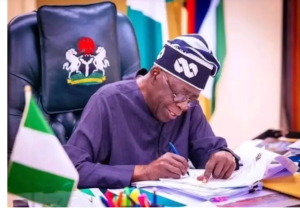
In a significant move aimed at reshaping the landscape of higher education financing in the country, President Bola Tinubu signed the Student Loans (Access to Higher Education) Act (Repeal and Re-Enactment) Bill, 2024, into law on Wednesday. This decisive action marks a pivotal moment in the ongoing efforts to enhance access to tertiary education for Nigerian students.
The genesis of this legislative milestone lies in the extensive reviews conducted by both the Senate and the House of Representatives on the report of the Committee on Tertiary Institutions and TETFund. These thorough examinations sought to address the challenges plaguing the accessibility of higher education and to formulate effective solutions that align with the evolving needs of the educational landscape.
The Student Loans Act represents a comprehensive overhaul of the existing framework governing student loans, aiming to streamline the process and make higher education more financially attainable for aspiring scholars across the nation. By repealing and re-enacting the bill, the government demonstrates its commitment to fostering an environment where education is not merely a privilege but a fundamental right accessible to all.
While specific details of the newly enacted law are yet to be disclosed, it is anticipated that it will introduce significant reforms designed to alleviate the financial burden on students pursuing tertiary education. These reforms may include provisions for lower interest rates, extended repayment periods, and enhanced mechanisms for loan disbursement and management. Such measures are crucial in ensuring that no deserving student is deprived of educational opportunities due to financial constraints.
Moreover, the enactment of this legislation underscores the government’s recognition of the pivotal role education plays in driving national development and economic growth. By investing in human capital through initiatives like the Student Loans Act, Nigeria stands to benefit from a more skilled workforce equipped to navigate the complexities of the modern world and contribute meaningfully to society.
As the details of the Student Loans Act unfold in the coming days, stakeholders in the education sector, including students, educators, policymakers, and the wider public, eagerly anticipate the positive impact it will have on higher education accessibility and affordability. The implementation of this law represents not only a legislative triumph but also a beacon of hope for countless young Nigerians aspiring to fulfill their academic aspirations.
In conclusion, President Bola Tinubu’s signing of the Student Loans Act marks a significant milestone in the ongoing quest to democratize access to higher education in Nigeria. By enacting progressive reforms informed by thorough deliberations and expert insights, the government reaffirms its unwavering commitment to empowering the youth and building a brighter future for the nation.
Details of the enacted law are expected to be unveiled shortly, heralding a new era of opportunity and inclusivity in Nigerian higher education.
Naija News
Nigeria’s Current Affairs: A Comprehensive Overview

Nigeria, the giant of Africa, remains a nation pulsating with dynamic socio-political and economic developments. In recent times, a plethora of events has unfolded, offering a nuanced glimpse into the country’s multifaceted landscape. From government initiatives to combat illegal mining to discussions on minimum wage and security challenges, Nigeria’s current affairs paint a picture of a nation navigating through a myriad of challenges and opportunities.
Marshaling Against Illegal Mining:
The launch of the Marshals by Minister Dele Alake underscores Nigeria’s commitment to tackling the menace of illegal mining and solid mineral smuggling. With the formation of this squad from the Nigerian Security and Civil Defense Corps (NSCDC), the government aims to safeguard the country’s mineral resources and curb illicit activities in the mining sector.
Governors’ Deliberations on Minimum Wage:
The Nigeria Governors Forum’s deliberations on the new minimum wage highlight the complexities involved in setting wage standards in a diverse nation like Nigeria. Emphasizing data-driven and evidence-based decisions, the governors underscore the importance of considering individual state peculiarities and economic realities before arriving at a consensus on the minimum wage issue.
Military Response to Security Challenges:
The recent tragic incidents in Delta State have once again brought to the forefront the challenges faced by Nigeria’s security forces. The military’s commitment to maintaining a strong presence in volatile regions demonstrates a resolute stance against perpetrators of violence, emphasizing the need for justice and restoring peace in affected areas.
Foreign Exchange Backlog Clearance and Airline Concerns:
While the Central Bank’s announcement of clearing foreign exchange backlogs is a positive development, concerns raised by foreign airline operators underscore the importance of transparency in financial transactions. The demand for evidence of payment reflects the need for accountability and clarity in economic policies affecting foreign entities operating in Nigeria.
Military Successes Against Terrorism:
The Minister of Information’s disclosure of military successes against terrorism offers a glimmer of hope in Nigeria’s ongoing battle against insurgency. However, it also serves as a reminder of the persistent threats faced by the country and the continued efforts required to ensure the safety and security of its citizens.
Political Developments and Leadership Dynamics:
Eyitayo Jegede’s withdrawal from the Ondo governorship race and the meeting between Governor Ododo and President Tinubu highlight the intricacies of Nigerian politics and the evolving dynamics within political parties. Additionally, the accusations leveled by Nnamdi Kanu’s family against Igbo leaders underscore the complexities surrounding identity politics and leadership accountability.
Economic Measures Amidst Challenges:
President Tinubu’s directive to ban foreign trips by government officials reflects a proactive approach to cost-cutting measures amid economic challenges. This move signals a commitment to fiscal responsibility and prudent financial management in navigating Nigeria’s economic landscape.
Conclusion:
Nigeria’s current affairs encapsulate a tapestry of events, from governmental initiatives to combat illegal activities to discussions on minimum wage and security challenges. As the nation grapples with various issues, including economic fluctuations and security threats, these developments underscore the importance of concerted efforts towards sustainable growth, transparency, and accountability in governance. Only through collective action and strategic policymaking can Nigeria overcome its challenges and realize its full potential as a beacon of progress in Africa.
Naija News
Senate President’s Claims on Delta State Military Murders Draw Criticism
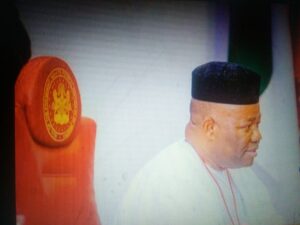
The recent assertion by Senate President Godswill Akpabio regarding the gruesome murder of 16 military personnel in Delta State has sparked controversy and drawn sharp criticism from civil society organizations (CSOs) and security experts.
Akpabio’s remarks, made during a Senate plenary session, suggested a connection between the massacre and foreign mercenaries, implying that the perpetrators may not be from the Niger Delta region. This statement came as the Senate deliberated on setting up a committee to investigate the circumstances surrounding the killings.
Reacting to Akpabio’s claims, Auwal Musa Rafsanjani, Executive Director of Civil Society Legislative Advocacy Centre (CISLAC) and Transparency International-Nigeria (TI-Nigeria), condemned any attempt to provide a soft landing for the perpetrators of such heinous crimes. Rafsanjani emphasized that criminal acts should be unequivocally condemned, regardless of the perpetrators’ origins, asserting that a criminal remains a criminal irrespective of their nationality.
Similarly, Gad Peter, Executive Director of the CLEEN Foundation, cautioned political leaders against making hasty or speculative comments following incidents or crimes. Peter highlighted the importance of providing evidence to support such claims, especially when attributing responsibility to foreign entities. He called on Akpabio to substantiate his statement by providing concrete details regarding the alleged foreign involvement in the attack, suggesting that failure to do so could have significant diplomatic implications.
The remarks by CSOs and security experts underscore the need for responsible and evidence-based communication from public officials, particularly in matters involving national security and criminal investigations. Speculative statements not only risk inflaming tensions but also undermine public trust and confidence in the government’s ability to address security challenges effectively.
The call for thorough investigations into the Delta State military murders remains paramount, with stakeholders urging transparency and accountability in the quest for justice. As the nation grapples with security threats and acts of violence, it is imperative that political leaders exercise caution in their public statements, prioritizing factual accuracy and adherence to due process.
Ultimately, the resolution of such tragic incidents demands a concerted effort from all stakeholders, guided by a commitment to uphold the rule of law and protect the safety and security of all citizens, including members of the armed forces who bravely serve the nation.
-
Entertainment6 months ago
If you don’t laugh, I promise to return your data😂😂😂
-
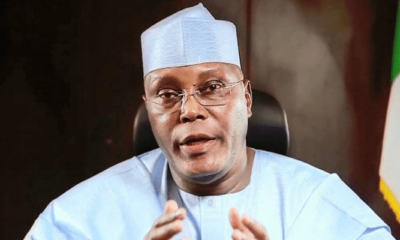
 Naija News4 months ago
Naija News4 months agoAtiku Abubakar 2024 New Year Message To Nigerians
-

 Entertainment6 months ago
Entertainment6 months agoScammers Swipe ₦5 Billion From 3 Fintechs In Just 8 Months
-
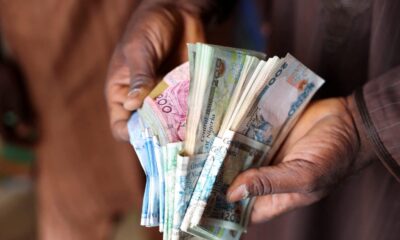
 Naija News6 months ago
Naija News6 months agoNaira Surges To ₦780/$1 in Official Market Amid CBN’s Forex Moves
-

 Celebrity Gist6 months ago
Celebrity Gist6 months ago“He has my kind of voice” – Brain Jotter speaks on colleague, OGB ‘copying’ him
-
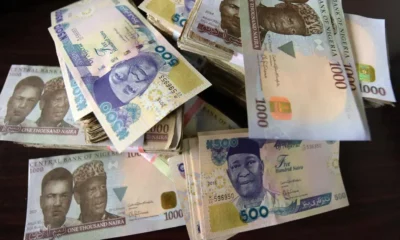
 Naija News5 months ago
Naija News5 months agoNIGERIA NEWSCBN Directs Banks To Continue Issuance, Acceptance Of Old Naira Notes After Supreme Court Verdict
-

 Celebrity Gist6 months ago
Celebrity Gist6 months agoPortable’s ex-signee, Young Duu acquires multi-million naira Benz
-

 Celebrity Gist4 months ago
Celebrity Gist4 months ago“All paid for” – Wizkid flaunts ₦1.4 billion Ferrari SF90

